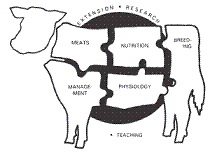Animal Science, Department of

Nebraska Beef Cattle Reports
Date of this Version
2023
Citation
2023 Nebraska Beef Cattle Report
UNL Beef, Institute of Agriculture and Natural Resources, University of Nebraska-Lincoln
Abstract
Preventing the spoilage of fresh, chilled beef is crucial for maintaining market value. Since organic acids are regularly used in the beef industry for pathogen control, their ability to improve the shelf life of fresh, chilled beef was evaluated. Fresh, chilled beef was individually treated with 4.5% lactic acid, 2.5% Beefxide®, or 380 ppm peroxyacetic acid. After storage, Lactococcus, a genus of lactic acid bacteria, became the most common spoilage organism across all treatment and control samples. Organic acid treatments were not able to slow the growth of this genus and may not be an effective method to control spoilage when lactic acid bacteria are the dominant spoilage organism present.
Included in
Large or Food Animal and Equine Medicine Commons, Meat Science Commons, Veterinary Preventive Medicine, Epidemiology, and Public Health Commons

